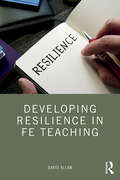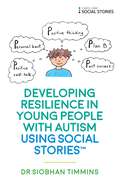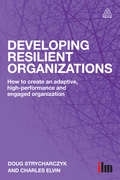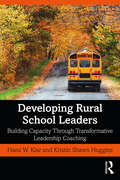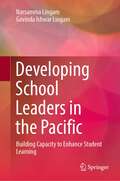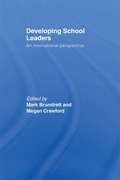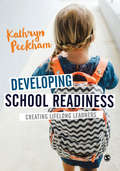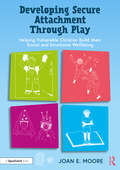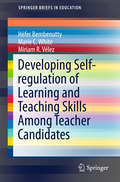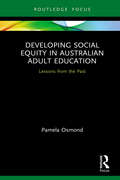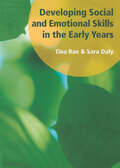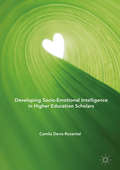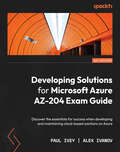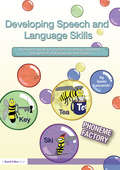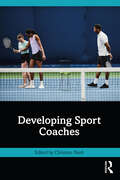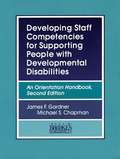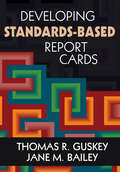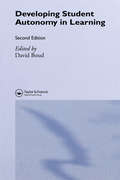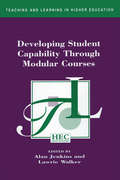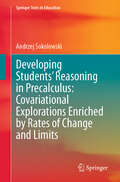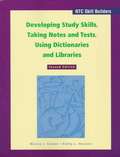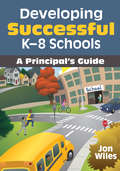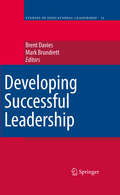- Table View
- List View
Developing Resilience in FE Teaching
by David AllanDeveloping Resilience in FE Teaching explores the essence of resilience and provides practical approaches for working in the Further Education sector. Emphasising the importance of reflection and self-growth, it outlines strategies to help teachers identify and deal with stress, using real-life case studies to exemplify key concerns. This book is divided into three main sections: Part One identifies the sector’s needs and recognizes resilience as a key attribute for FE teachers to survive and thrive in the modern world, explores the importance of strength and positivity in both physical and mental health, and examines the many ways in which these contribute to the development of individual resilience; Part Two outlines a variety of practical strategies and approaches for teachers to utilise their experiences to construct resilience over time; and Part Three presents real-life scenarios of resilience-building from various professionals working in the sector. Developing Resilience in FE Teaching synthesizes a wide range of current ideas and research to provide a practical and useful guide for FE teachers, and for those working in the FE sector. It serves as an important resource for teachers and equips them with the necessary skills to become resilient professionals in the modern workplace.
Developing Resilience in Young People with Autism using Social Stories™
by Siobhan TimminsYoung people with autism can be particularly susceptible to setbacks, often leading to depression and a sense of hopelessness. Using Social Stories™, this book introduces a different way of looking at common life setbacks, and offer tools to overcome these obstacles, build resilience and develop coping strategies for the future. Based on Carol Gray's highly effective Social Stories™ model, this new guide shows how to help individuals with autism deal with challenges specific to them, and how to bounce back from the negative experiences that they encounter. This book is an invaluable guide for learning to create personalised Social Stories™ that can be used to develop resilience in people with autism and help them to cope better with adversity.
Developing Resilient Organizations
by Doug Strycharczyk Charles ElvinMuch of the fear and uncertainty surrounding the global recession is concerned with the adverse impact it will have on organisations and society. However, recessions are nothing new. We know from past experience that when a recession is over, there always emerge organisations and individuals who have not only survived but have thrived. They often emerge stronger, fitter and better performing. Developing Resilient Organizations argues that one of the fundamental keys to survival in these circumstances is resilience or mental toughness. It can make challenge and change an opportunity rather than a threat. The book addresses a wide variety of organizational issues including motivation, performance, staff retention, behaviour, trust, attention span and teamwork. With case studies from leading organizations across the public and private sector internationally, it will show you how to develop organizational performance, well being and a positive approach to adversity and change in your organization.
Developing Resilient Organizations: How to Create an Adaptive, High-Performance and Engaged Organization
by Doug Strycharczyk Charles ElvinMuch of the fear and uncertainty surrounding the global recession is concerned with the adverse impact it will have on organisations and society. However, recessions are nothing new. We know from past experience that when a recession is over, there always emerge organisations and individuals who have not only survived but have thrived. They often emerge stronger, fitter and better performing. Developing Resilient Organizations argues that one of the fundamental keys to survival in these circumstances is resilience or mental toughness. It can make challenge and change an opportunity rather than a threat. The book addresses a wide variety of organizational issues including motivation, performance, staff retention, behaviour, trust, attention span and teamwork. With case studies from leading organizations across the public and private sector internationally, it will show you how to develop organizational performance, well being and a positive approach to adversity and change in your organization.
Developing Rural School Leaders: Building Capacity Through Transformative Leadership Coaching
by Hans W. Klar Kristin Shawn HugginsDeveloping Rural School Leaders combines a focus on rural education and school leadership development to illustrate how the teaching and learning conditions in rural schools can be enhanced through transformative leadership coaching. By unpacking literature related to rural school leadership development and using case studies to authentically illustrate the complexities involved in rural school leadership development, this book explores how leaders can develop their abilities to increase data-informed instructional decision making, create a culture that supports teaching and learning, and develop other leaders. Ultimately, this important book concludes with an exploration of the opportunities and challenges of developing rural school leaders.
Developing School Leaders in the Pacific: Building Capacity to Enhance Student Learning
by Govinda Ishwar Lingam Narsamma LingamThis book provides detailed insights on the training and development for Pacific Island school leaders. It draws extensively on original empirical research that explores school leaders’ perceptions of how leadership and management training impacted their professional practices, and how these practices in turn impacted the dynamics of school operations. This book addresses a critical need to understand how to support leadership development for all Pacific schools, but especially in schools that are faced with the increasing challenges of learning and teaching conditions. In small island developing states in the Pacific region, school leaders face a myriad of challenges due to limited human and material resources, and a fragile economic base. Written by Pacific Islander authors, this book provides insights from different countries in the Pacific Islands. It shows how contextual challenges can exert enormous pressure on school leaders who are leading and managing schools without any leadership preparation.Given the importance of effective leadership practices and its impact on student learning outcomes, this book aims to be a source of reference for practitioners and educational authorities who have a vested interest in the provision of quality education in the Pacific region and beyond.
Developing School Leaders: An International Perspective
by Megan Crawford Mark BrundrettMany countries face a crisis in recruitment to the most senior positions in schools at a time when arguments rage about the best way to develop our school leaders. Focusing on leadership development in ten diverse cultural contexts, this book brings together some of the most senior commentators in the field of educational leadership development to provide a global perspective on leadership development programmes and practices. The rise of leadership development programmes has presented opportunities for some and challenges for others. These challenges are both practical and conceptual and relate to a series of questions that are unpacked in the book including: What is the appropriate balance between the academic and the practical in leadership programmes? Should provision be located in higher education institutions, in other government sponsored organizations or commissioned from the private sector? Are models of leadership studies derived from the business and industry relevant to schools? How can research into impact inform leadership development policy and strategy? Should programmes be integrated into higher degree provision or should new and innovative forms of accreditation be developed? This book should be fascinating reading for all those engaged in educational research and teaching, and working, in educational leadership.
Developing School Readiness: Creating Lifelong Learners
by Kathryn PeckhamShortlisted for Best Professional Book by Nursery World Awards 2017! We've all heard of the term school readiness but how many of us understand what is meant by it? What does it mean in the context of child development and wellbeing and what implications does it have for creating enthusiastic lifelong learners? How can we really give our children the best start in their most formative years? This book will ensure you understand school readiness but also understand: the experiential nature of children's learning how future success is affected by the experiences that have gone before the importance of your role in the child’s journey This book will give you the confidence to deliver practice that exceeds expectations and the knowledge to stand by your approach to teaching and caring for the children you work with. Kathryn Peckham will be discussing key ideas from Developing School Readiness: Creating Lifelong Learners in the SAGE Early Years Masterclass, a free professional development experience hosted by Kathy Brodie. To sign up, or for more information, click here.
Developing School Readiness: Creating Lifelong Learners
by Kathryn PeckhamShortlisted for Best Professional Book by Nursery World Awards 2017! We′ve all heard of the term school readiness but how many of us understand what is meant by it? What does it mean in the context of child development and wellbeing and what implications does it have for creating enthusiastic lifelong learners? How can we really give our children the best start in their most formative years? This book will ensure you understand school readiness but also understand: the experiential nature of children′s learning how future success is affected by the experiences that have gone before the importance of your role in the child’s journey This book will give you the confidence to deliver practice that exceeds expectations and the knowledge to stand by your approach to teaching and caring for the children you work with. Kathryn Peckham will be discussing key ideas from Developing School Readiness: Creating Lifelong Learners in the SAGE Early Years Masterclass, a free professional development experience hosted by Kathy Brodie.
Developing Secure Attachment Through Play: Helping Vulnerable Children Build their Social and Emotional Wellbeing
by Joan E. MooreDeveloping Secure Attachment Through Play offers a range of imaginative and engaging play-based activities, designed to help vulnerable young children forge safe attachments with their caregivers. The book focuses on key developmental stages that may have been missed due to challenging life circumstances, such as social-emotional development, object permanence and physical and sensory development. It also considers pertinent issues including trauma, separation, loss and transition. Chapters explore each topic from a theoretical perspective, before offering case studies that illustrate the theory in practice, and a range of activities to demonstrate the effectiveness of play in developing healthy attachments. Key features of this book include: • 80 activities that can be carried out at home or in educational settings, designed to facilitate attachment and enhance social-emotional development; • case vignettes exploring creative activities such as mirroring, construction play, physical play, baby doll play and messy play; • scripts and strategies to create a safe and respectful environment for vulnerable children; • photocopiable and downloadable resources, including early learning goals, a collection of therapeutic stories and a transition calendar By engaging children in these activities, parents, caregivers and practitioners can help the children in their care gain a sense of belonging and develop their self-esteem. This will be a valuable resource for early years practitioners, adoptive, foster and kinship parents, and therapists and social workers supporting young children.
Developing Self-regulation of Learning and Teaching Skills Among Teacher Candidates
by Héfer Bembenutty Marie C. White Miriam R. VélezDuring the last several decades, self-regulation of learning has permeated all areas of learning and development, including teaching preparation programs. Self-regulatory competences are essential for successful academic achievement and performance. This book is written for teacher candidates to believe that if they heard a call to teach, they can see in each paragraph of this book that they can do it. Teacher candidates reading this book will find themselves vicariously portrayed in the journey of the four teacher candidates described in this book. They can empathize with their struggles but will also find assurance that through self-regulation their own journeys and dreams could have great outcomes. This book is also written for teacher educators in teaching education programs so that they would realize that by transforming their curriculum in light of new findings on self-regulation, they could facilitate the training process of teacher candidates under their supervision and that self-regulation of learning and teaching matters for teacher candidates. Drawing on a rich body of research and theory on self-regulation of learning, Bembenutty, White, and Vélez present compelling case studies indicating that the capability of teacher candidates to self-regulate their attainment of educational goals depends on their exposure to self-regulated teacher educators, especially as they model, scaffold, and mentor in classroom settings. This important text gives numerous examples of how teacher educators can become role models and agents for self-regulatory change, and it will be an invaluable resource for courses in education, psychology, and human development. Barry J. Zimmerman, Professor Emeritus Graduate Center, The City University of New York In an effective blend of theory and case histories, Bembenutty, White, and Vélez provide valuable information and advice for prospective teachers and teacher educators. Their focus on help seeking is critical given the array of resources available to overcome early difficulties especially for teachers with significant challenges. Also important is helping them understand the role of delay of gratification in the face of expanding sources of distraction. Stuart A. Karabenick, Research Professor University of Michigan This book builds a really strong case for the importance of self-regulation in teacher education. Moreover, it tells a fascinating story of educational success against the odds, made possible by personal stamina as well as contextual support. Both teacher students and teacher educators around the world will find this book a wonderful inspiration. Ivar Bråten, Professor University of Oslo, Norway This is a practical book which provides a compelling narrative with page after page on teacher self-regulatory functioning. I recommend this book for teacher preparation programs, and I will definitely share it with many of my students and colleagues. Anastasia Kitsantas, Professor George Mason University
Developing Social Equity in Australian Adult Education: Lessons from the Past
by Pamela OsmondDeveloping Social Equity in Australian Adult Education: Lessons from the Past presents a case study of the trajectory of an Australian adult basic education program in New South Wales from its humanist, social justice beginnings, through forty years of destabilising change. It identifies the influences and influencers that have directed this change; those that were responsible for the creation of the field in its foundation years, and that were displaced by other, more powerful actors representing the global influence of the neoliberal ideology. The story is told largely through archival evidence and the voices of those practitioners who helped shape the discourse and practice of the foundation years, and who were required to respond to constantly changing policies and socio-economic contexts. It discusses some lessons that might be learnt from the past in order that a new set of actors might be mobilised to promote an alternate discourse. This book will appeal to students and scholars of social justice and adult education, and practitioners involved in adult education.
Developing Social and Emotional Skills in the Early Years
by Sara Daly Tina RaeDeveloping Social and Emotional Skills in the Early Years is a comprehensive programme for early years providers to support the development of young children's social and emotional skills. This latest offering from Tina Rae and Sara Daly will support early years practitioners in teaching pupils to develop basic skills in communicating emotions, making and sustaining friendships and modelling genuine and appropriate social and emotional responses. With an introductory PowerPoint presentation and facilitator notes, Developing Social and Emotional Skills in the Early Years will provide you with the practical and relevant resources you need to support your pupils' social and emotional development.
Developing Socio-Emotional Intelligence in Higher Education Scholars
by Camila Devis-RozentalThis book explores the impact of socio-emotional intelligence on wellbeing in higher education. Stemming from years of investigation and educational expertise with trainee teachers and academics, the book identifies ways in which socio-emotional intelligence can be developed in university environments. The author begins by analysing the concept of socio-emotional intelligence and its development, before confronting distinctive areas for improvement within the context of teaching and learning in higher education. The book explores the importance of understanding and labelling emotions, and how opportunities for self-reflection arise through an environment that meets practical needs. The author contends that support from other scholars is vital to the development of socio-emotional intelligence. The book concludes with a set of practical suggestions for promoting personal development. It will be a valuable resourse for anyone working in higher education who is interested in improving their own wellbeing and that of those around them.
Developing Solutions for Microsoft Azure AZ-204 Exam Guide: Discover the essentials for success when developing and maintaining cloud-based solutions on Azure
by Paul Ivey Alex IvanovBuild a thorough understanding of the technology, concepts, and development patterns used in building applications in Azure, through detailed explanations, hands-on exercises, and downloadable code samplesKey FeaturesWritten by two Microsoft technical trainers to help you explore the exam topics in a structured wayUnderstand the “why”, and not just “how” behind design and solution decisionsFollow along examples with downloadable code samples to help cement each topic's learning objectiveBook DescriptionWith the prevalence of cloud technologies and DevOps ways of working, the industry demands developers who can build cloud solutions and monitor them throughout their life cycle. Becoming a Microsoft-certified Azure developer can differentiate developers from the competition, but with such a plethora of information available, it can be difficult to structure learning in an effective way to obtain certification. Through easy-to-understand explanations and exercises, this book will provide a more palatable learning experience than what you may expect from an exam preparation book. You'll start off with a recap of some important cloud concepts, such as IaaS, PaaS, and SaaS. From there, you'll learn about each relevant solution area, with use cases. The chapters also cover different implementation methodologies, both manual and programmatic – ranging from compute resources such as App Service and serverless applications to storage, database, security, monitoring solutions, and connecting to third-party services. By the end of this book, you'll have learned everything you need to pass the AZ-204 certification exam and have a handy, on-the-job reference guide.What you will learnDevelop Azure compute solutionsDiscover tips and tricks from Azure experts for interactive learningUse Cosmos DB storage and blob storage for developing solutionsDevelop secure cloud solutions for AzureUse optimization, monitoring, and troubleshooting for Azure solutionsDevelop Azure solutions connected to third-party servicesWho this book is forThis book is for Azure developers looking to improve their Azure development knowledge to pass the AZ-204 exam. This book assumes at least one year of professional development experience with Azure, with the ability to program in at least one language supported by Azure. Existing Azure CLI and PowerShell skills will also be useful.
Developing Speech and Language Skills: Phoneme Factory
by Gwen LancasterThis book is part of the Phoneme Factory Project undertaken by Granada Learning in partnership with the Speech and Language Therapy Research Unit (SLTRU) in Bristol. It aims to provide guidance for teachers, SENCos, SLTs and parents regarding: criteria for referral to speech and language therapy phonological disorders appropriate intervention approaches that can be used in the classroom and at home. Complementing the book is a CD containing downloadable resources including a picture library for the classroom and the home, as well as checklists and other time-saving documents.
Developing Sport Coaches
by Christine NashEvolving from the concept of coach education, which is generally accepted to be the more formal, didactic mode of transmitting information to coaches and prospective coaches, coach development is a relatively new field of research and practice. Developing Sport Coaches is a new text that supports the holistic longterm development of sport coaches as well as help aid existing sport coaches to understand their development. Research in coach learning and coach education has raised important questions about the effectiveness, relevance and value placed on traditional coach education by sport coaches in relation to their practice. The dissatisfaction expressed by many coaches, at all stages of coaching practice, has led to the inception of coach development. This text enables coach development to be studied in higher education institutions as well as enabling organisations to embed coach developers within their organisations. Written for the sport coaching and expanding coach development market, this book will be used by higher education institutions students as both a core and additional text to advance research and knowledge in this area. At the same time, this book is also a useful reading for practising sport coaches, coach developers and organisations who are currently examining their structures and processes to move their coaching provision from a formal coach education delivery to a more bespoke offering.
Developing Staff Competencies For Supporting People With Developmental Disabilities: An Orientation Handbook
by James F. Gardner Michael S. ChapmanFormerly titled "Staff Development in Mental Retardation Services: A Practical Handbook, " this second edition, in an easier-to-use format, gives service providers helpful strategies for increasing effectiveness and maintaining well-being while working in the rewarding yet challenging field of human services. Filled with answers to pertinent questions about service development, delivery, and assessment, this intuitive guide also offers guidelines for working with families, coping with stress and burnout, and enhancing service management and quality.
Developing Standards-Based Report Cards
by Thomas R. Guskey Ms Jane M. BaileyDevelop standards-based report cards that are meaningful to students, parents, and educators! Helping school leaders gain support for transitioning from traditional to standards-based report cards, this book guides educators in aligning assessment and reporting practices with standards-based education and providing more detailed reports of children’s learning and progress. This accessible volume: Provides a clear framework for developing standards-based report cards; Shows how to communicate with parents, students, and other stakeholders about changes; Illustrates how to achieve grading consistency without increasing teachers’ workloads or violating their professional autonomy; Includes examples of standards-based report cards that can be adapted to a school’s needs.
Developing Student Autonomy in Learning
by David BoudFirst Published in 1987. Routledge is an imprint of Taylor & Francis, an informa company.
Developing Student Capability Through Modular Courses (Teaching and Learning in Higher Education)
by Alan Jenkins Lawrie WalkerHigher education in the UK has recently been transformed due to the introduction of module-style degree programmes. This collection of essays and case studies reviews the experiences of both students using the new modules and teachers integrating modular systems into their curricula.
Developing Students’ Reasoning in Precalculus: Covariational Explorations Enriched by Rates of Change and Limits (Springer Texts in Education)
by Andrzej SokolowskiThis book aims to develop high school and undergraduate students’ covariational reasoning and algebraic skills to succeed in calculus and STEM subjects. The book reflects on contemporary research in math education where students explore algebraic tools and reason mathematically to construct new knowledge. The volume is made up of six chapters covering polynomial, rational, and transcendental functions. An early introduction of limits to support the analyses of linear functions progresses to other book chapters ensuring consistency, parallelism, and a scaffold knowledge delivery. A gradual introduction to function rates of change along with function monotonicity and concavity intertwines with modeling techniques that merge students’ mathematical reasoning with scientific contexts. A forthcoming online component of the book consists of ready-to-download exploratory modeling activities and worksheets that further solidify students’ fluency in understanding how to apply abstract math concepts to gain a deeper understanding of natural and social sciences.
Developing Study Skills, Taking Notes and Tests, Using Dictionaries and Libraries
by Marcia J. Coman Kathy L. HeaversWere you ever taught how to study? Instructors often assume that students beyond grade school know and use good study techniques. You may know some people who seem to be able to do more in less time and get good grades besides. How do they do it? In this unit you will learn some simple techniques that good students consider most important when studying. Now you can discover some of their secrets.
Developing Successful K-8 Schools: A Principal's Guide
by Dr Jon W. WilesOffers practical strategies and a step-by-step plan for developing or transitioning to a K–8 school, including methods for curriculum design, student assessment, and more.
Developing Successful Leadership
by Brent Davies Mark BrundrettResearch has shown that school leadership is second only to classroom teaching in its effect on pupil learning. As the demands on management teams become ever more complex, this volume offers a fresh and expansive view on the challenges to be met in developing a leadership career. With contributions from some of the most accomplished commentators on school leadership and management from around the world, this book moves away from the simple 'how to' of becoming a principal, focusing instead on the wider issues of becoming a successful leader. The central aim has been to assemble powerful statements from international authorities that encapsulate leading-edge thinking on a group of interconnected themes based on the notion of developing successful leadership in, and beyond, schools. In so doing the text examines strategies for existing leaders developing their full capacity as well as enhancing the skills of those new to, or aspiring to, a leadership role. The chapters contributed by a carefully selected group of leading educationalists present insights on a number of central themes, including: developing new skill sets in leadership, the ethical and moral dimensions of leading an organisation, Leadership for instructional and pedagogical success, developing leadership capacity and capability through strategic activity. Rather than taking a technical approach of how to undertake the managerial or administrative tasks, the authors seek instead to develop critical leadership perspectives and skills, with chapters on vitally important topics such as strategies for maximizing the potential of the leadership team as a whole. They draw not only upon the literature in the field of educational leadership but also a wider literature in the field of business and management. This diversity of perspective ensures this book's appeal to a broad international readership.
